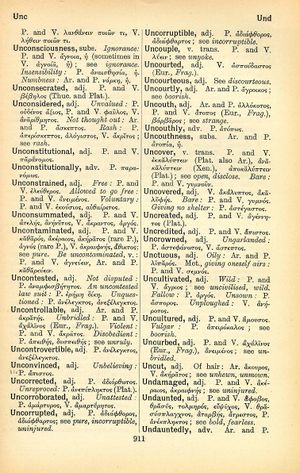uncouth: Difference between revisions
From LSJ
τὸ δ' ἡδέως ζῆν καὶ ἱλαρῶς οὐκ ἔξωθέν ἐστιν, ἀλλὰ τοὐναντίον ὁ ἄνθρωπος τοῖς περὶ αὑτὸν πράγμασιν ἡδονὴν καὶ χάριν ὥσπερ ἐκ πηγῆς τοῦ ἤθους προστίθησιν → but a pleasant and happy life comes not from external things, but, on the contrary, man draws on his own character as a source from which to add the element of pleasure and joy to the things which surround him
(CSV5) |
m (Text replacement - "<b class="b2">Frag.</b>" to "''Frag.''") |
||
| Line 2: | Line 2: | ||
|Text=[[File:woodhouse_911.jpg|thumb|link={{filepath:woodhouse_911.jpg}}]]'''adj.''' | |Text=[[File:woodhouse_911.jpg|thumb|link={{filepath:woodhouse_911.jpg}}]]'''adj.''' | ||
Ar. and P. [[ἀλλόκοτος]], P. and V. [[ἄτοπος]] (Eur., | Ar. and P. [[ἀλλόκοτος]], P. and V. [[ἄτοπος]] (Eur., ''Frag.''), [[βάρβαρος]]; see [[strange]]. | ||
}} | }} | ||

